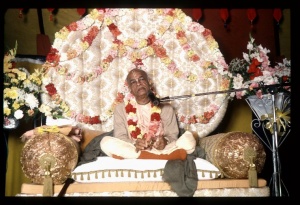SB 3.26.26: Difference between revisions
m (1 revision(s)) |
No edit summary |
||
| Line 1: | Line 1: | ||
{{info | {{info | ||
|speaker=Lord Kapiladeva the Supreme Personaliy of Godhead | |speaker=Lord Kapiladeva the Supreme Personaliy of Godhead | ||
|listener=Devahūti, mother of Lord Kapiladeva | |listener=Devahūti, mother of Lord Kapiladeva | ||
}} | }} | ||
[[Category:Srimad-Bhagavatam - Canto 03 Chapter 26]] | |||
[[Category:Bhagavatam Verses Spoken by Lord Kapila - Vanisource|032626]] | |||
<div style="float:left">'''[[Srimad-Bhagavatam]] - [[SB 3|Third Canto]] - [[SB 3.26: Fundamental Principles of Material Nature|Chapter 26: Fundamental Principles of Material Nature]]'''</div> | |||
<div style="float:right">[[File:Go-previous.png|link=SB 3.26.25]] '''[[SB 3.26.25]] - [[SB 3.26.27]]''' [[File:Go-next.png|link=SB 3.26.27]]</div> | |||
{{RandomImage}} | |||
==== TEXT 26 ==== | ==== TEXT 26 ==== | ||
<div | <div class="verse"> | ||
kartṛtvaṁ karaṇatvaṁ ca | :kartṛtvaṁ karaṇatvaṁ ca | ||
kāryatvaṁ ceti lakṣaṇam | :kāryatvaṁ ceti lakṣaṇam | ||
śānta-ghora-vimūḍhatvam | :śānta-ghora-vimūḍhatvam | ||
iti vā syād ahaṅkṛteḥ | :iti vā syād ahaṅkṛteḥ | ||
</div> | </div> | ||
| Line 16: | Line 22: | ||
==== SYNONYMS ==== | ==== SYNONYMS ==== | ||
<div | <div class="synonyms"> | ||
''kartṛtvam''—being the doer; ''karaṇatvam''—being the instrument; ''ca''—and; ''kāryatvam''—being the effect; ''ca''—also; ''iti''—thus; ''lakṣaṇam''—characteristic; ''śānta''—serene; ''ghora''—active; ''vimūḍhatvam''—being dull; ''iti''—thus; ''vā''—or; ''syāt''—may be; ''ahaṅkṛteḥ''—of the false ego. | |||
</div> | </div> | ||
| Line 23: | Line 29: | ||
==== TRANSLATION ==== | ==== TRANSLATION ==== | ||
<div | <div class="translation"> | ||
This false ego is characterized as the doer, as an instrument and as an effect. It is further characterized as serene, active or dull according to how it is influenced by the modes of goodness, passion and ignorance. | This false ego is characterized as the doer, as an instrument and as an effect. It is further characterized as serene, active or dull according to how it is influenced by the modes of goodness, passion and ignorance. | ||
</div> | </div> | ||
| Line 30: | Line 36: | ||
==== PURPORT ==== | ==== PURPORT ==== | ||
<div | <div class="purport"> | ||
Ahaṅkāra, or false ego, is transformed into the demigods, the controlling directors of material affairs. As an instrument, the false ego is represented as different senses and sense organs, and as the result of the combination of the demigods and the senses, material objects are produced. In the material world we are producing so many things, and this is called advancement of civilization, but factually the advancement of civilization is a manifestation of the false ego. By false ego all material things are produced as objects of enjoyment. One has to cease increasing artificial necessities in the form of material objects. One great ācārya, Narottama dāsa Ṭhākura, has lamented that when one deviates from pure consciousness of Vāsudeva, or Kṛṣṇa consciousness, he becomes entangled in material activities. The exact words he uses are, sat-saṅga chāḍi' kainu asate vilāsa | ''Ahaṅkāra'', or false ego, is transformed into the demigods, the controlling directors of material affairs. As an instrument, the false ego is represented as different senses and sense organs, and as the result of the combination of the demigods and the senses, material objects are produced. In the material world we are producing so many things, and this is called advancement of civilization, but factually the advancement of civilization is a manifestation of the false ego. By false ego all material things are produced as objects of enjoyment. One has to cease increasing artificial necessities in the form of material objects. One great ''ācārya'', Narottama dāsa Ṭhākura, has lamented that when one deviates from pure consciousness of Vāsudeva, or Kṛṣṇa consciousness, he becomes entangled in material activities. The exact words he uses are, ''sat-saṅga chāḍi' kainu asate vilāsa, te-kāraṇe lāgila ye karma-bandha-phāṅsa'': "I have given up the pure status of consciousness because I wanted to enjoy in the temporary, material manifestation; therefore I have been entangled in the network of actions and reactions." | ||
</div> | </div> | ||
__NOTOC__ | |||
<div style="float:right; clear:both;">[[File:Go-previous.png|link=SB 3.26.25]] '''[[SB 3.26.25]] - [[SB 3.26.27]]''' [[File:Go-next.png|link=SB 3.26.27]]</div> | |||
__NOTOC__ | |||
__NOEDITSECTION__ | |||
Revision as of 10:20, 8 May 2021

A.C. Bhaktivedanta Swami Prabhupada
TEXT 26
- kartṛtvaṁ karaṇatvaṁ ca
- kāryatvaṁ ceti lakṣaṇam
- śānta-ghora-vimūḍhatvam
- iti vā syād ahaṅkṛteḥ
SYNONYMS
kartṛtvam—being the doer; karaṇatvam—being the instrument; ca—and; kāryatvam—being the effect; ca—also; iti—thus; lakṣaṇam—characteristic; śānta—serene; ghora—active; vimūḍhatvam—being dull; iti—thus; vā—or; syāt—may be; ahaṅkṛteḥ—of the false ego.
TRANSLATION
This false ego is characterized as the doer, as an instrument and as an effect. It is further characterized as serene, active or dull according to how it is influenced by the modes of goodness, passion and ignorance.
PURPORT
Ahaṅkāra, or false ego, is transformed into the demigods, the controlling directors of material affairs. As an instrument, the false ego is represented as different senses and sense organs, and as the result of the combination of the demigods and the senses, material objects are produced. In the material world we are producing so many things, and this is called advancement of civilization, but factually the advancement of civilization is a manifestation of the false ego. By false ego all material things are produced as objects of enjoyment. One has to cease increasing artificial necessities in the form of material objects. One great ācārya, Narottama dāsa Ṭhākura, has lamented that when one deviates from pure consciousness of Vāsudeva, or Kṛṣṇa consciousness, he becomes entangled in material activities. The exact words he uses are, sat-saṅga chāḍi' kainu asate vilāsa, te-kāraṇe lāgila ye karma-bandha-phāṅsa: "I have given up the pure status of consciousness because I wanted to enjoy in the temporary, material manifestation; therefore I have been entangled in the network of actions and reactions."